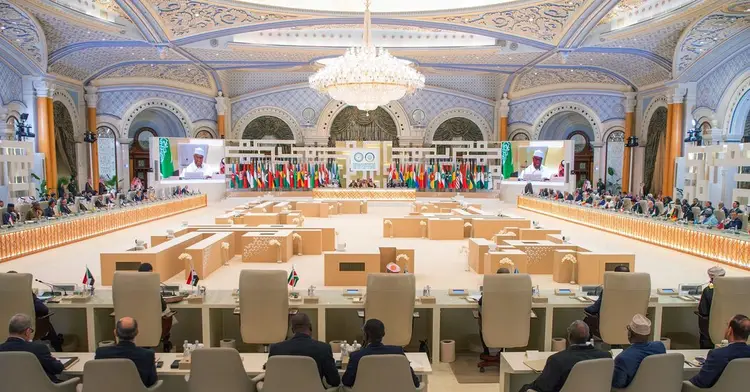Iran and Trump Are Front of Mind at Muslim Summit in Saudi Arabia

Leaders from various Arab and Muslim nations gathered in Riyadh for a meeting that was held to talk about the conflicts in Gaza and Lebanon.

November 11, 2024, updated at 4:02 PM Eastern Time.
On Monday, leaders from various Arab nations convened in Saudi Arabia's capital for a summit that takes place during a sensitive period for the kingdom. Saudi Arabia is hinting at improving its relationship with Iran following a long history of conflict between the two countries.
The meeting was called to address the ongoing violence in Gaza and Lebanon, where Israeli forces are engaged in conflict with militant groups supported by Iran. This discussion comes at a time of increased tensions in the region and the potential for a more aggressive approach from a Trump administration toward Iran.
Saudi Arabia had been on the verge of acknowledging Israel, but the ongoing conflicts in Gaza and Lebanon have stalled those plans. Currently, the kingdom and its partners are showing more openness towards Tehran. Last month, foreign ministers from the Gulf nations gathered together for their first meeting with their Iranian counterpart. Just recently, military leaders from Saudi Arabia and Iran met in Tehran, indicating a warming of relations as Iran contemplates how to respond to Israeli strikes on its land.
During his opening speech at the joint summit of the Arab League and the Organization of Islamic Cooperation on Monday, Saudi Arabia's influential crown prince, Mohammed bin Salman, highlighted the importance of the partnership.
He urged the global community to pressure Israel to honor Iran’s sovereignty and refrain from launching attacks on its land, addressing the crowd in Riyadh, Saudi Arabia's capital.
Saudi Arabia and Iran have been engaged in an enduring struggle for influence in the region, a rivalry that stems from their differing branches of Islam. Iran's regional alliances, which feature groups like Hamas in Gaza and Hezbollah in Lebanon, have consistently raised alarms for Saudi Arabia.
Although the Israeli military actions in Gaza and Lebanon have diminished the power of Hamas and Hezbollah, Iran continues to supply weapons and support to the Houthis in Yemen, who have been involved in assaults on the kingdom.
"The problem we've encountered, which has led to a rift in our relationship, is Iran's actions in the region. From our viewpoint, these actions have not promoted stability," said Saudi Foreign Minister Prince Faisal bin Farhan last week. "We are engaging in very straightforward and candid discussions with the Iranians."
On Monday, in his speech at the summit, Iran's vice president, Mohammad Rez Aref, referred to the situation in Gaza and Lebanon as a “disgraceful tragedy.” He called for a united response to halt the aggression from Israel, as reported by Iranian state news outlets.
However, not everyone in Riyadh seemed eager to seek closer cooperation. Lebanon's interim prime minister, Najib Mikati, urged nations to refrain from meddling in Lebanon's internal matters by backing certain groups, which subtly pointed to Iran's longstanding support for Hezbollah.
Experts believe that beyond demonstrating a friendlier stance towards Tehran, Saudi Arabia might be leveraging the summit in Riyadh to convey its position to the incoming Trump administration. Hasan Alhasan, a senior fellow specializing in Middle East policy at the International Institute for Strategic Studies, pointed out that President-elect Donald Trump has expressed his intention to "end wars" once he assumes office.
Mr. Alhasan pointed out that Saudi Arabia may be attempting to present itself as a desirable and reliable partner for the Trump administration, especially if Trump keeps his promise to negotiate a resolution to the conflict. This is particularly relevant considering that diplomatic initiatives from other regional players, especially Qatar and Egypt, have not been successful.
The summit from last year took place shortly after Israel began military operations against Hamas in Gaza, following the group's lethal assault on October 7. During that gathering, the participating leaders issued a statement urging for a ban on arms sales to Israel.
In the months that have passed, health officials in Gaza report that the number of fatalities has surpassed 43,000. Meanwhile, Israel has initiated a ground offensive in Lebanon targeting Hezbollah.
The statement released on Monday following this year's summit shared many similarities with last year's announcement. It criticized Israel's actions in Gaza once more and once again urged for an arms embargo.
It also cautioned about the risks of escalating tensions and the potential spread of conflict into Lebanon, as well as breaches of Iran's sovereignty.
Ismaeel Naar serves as an international journalist for The Times, focusing on the Gulf region. He is currently located in Dubai, UAE. Learn more about Ismaeel Naar.









































